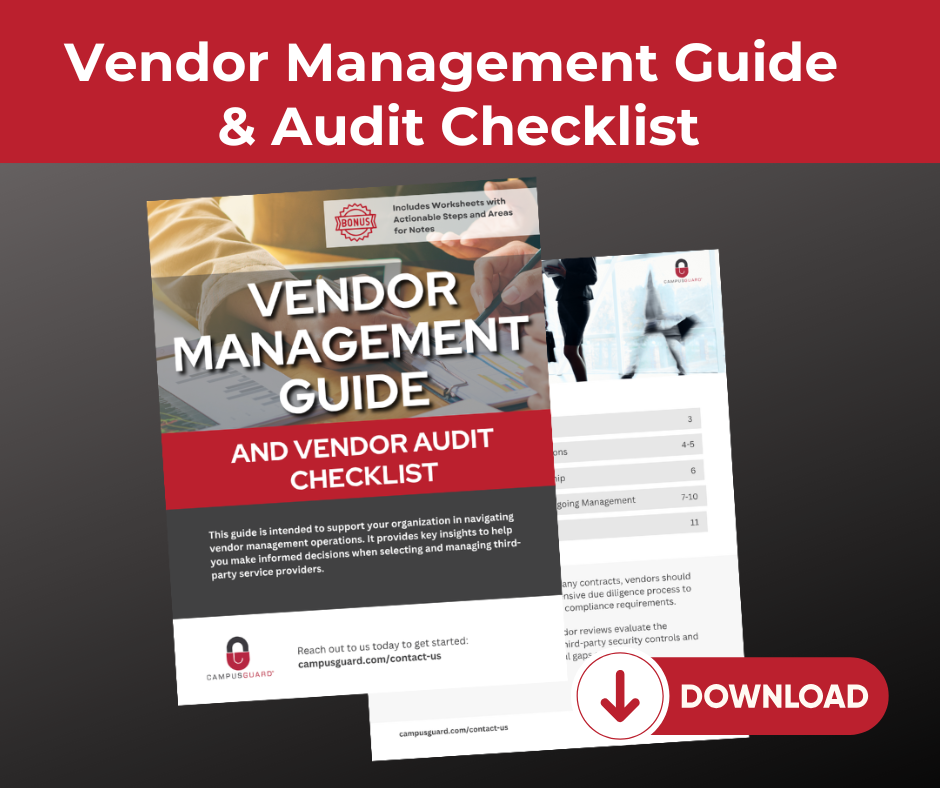
Third-Party Vendor Management
Outsourcing to third-party vendors can be beneficial to organizations lacking in staff or technology resources; however, this can also increase your organization’s exposure to risks such as data breaches of third-party systems.
Before any contracts are signed, the vendor should undergo a thorough vendor assessment to verify that compliance requirements are met.
Why Choose CampusGuard for Your Vendor Reviews?
CampusGuard’s vendor reviews assess and verify that third-party security controls have been implemented and identify any potential gaps or risks.
Access the Vendor Management Guide & Audit Checklist
Do you feel confident in your approach to choosing vendors?
Selecting the right partner and knowing how to manage them is critical, not just for performance, but for protecting your organization from unnecessary risk.
Our comprehensive guide includes:
- Vendor Management Overview
- Vendor Reviews: Pre-contract evaluations
- Tips for a successful vendor relationship
- Vendor Audit Checklist: Selection and Ongoing Management
- Additional help & resources
Benefits of a Vendor Review
Reviewing third-party service providers with a thorough vendor risk assessment is a critical step in ensuring the security, compliance, quality, and reputation of your business operations.
-
Reduce risks
A third-party vendor risk assessment can help reduce the risk of fraud, security breaches, data breaches, and other types of security incidents. By thoroughly evaluating a vendor's credentials, reputation, and security protocols, you can identify potential risks and take steps to mitigate them. -
Reduce cost
A vendor audit and risk assessment can help you identify the most cost-effective solutions and avoid vendors that are overpriced or unreliable—saving you money. -
Increase compliance
Many organizations fail to ensure that vendors are adhering to evolving regulations and compliance requirements. Vendor reviews and vendor risk assessments can help ensure that third parties meet these standards, reducing the risk of non-compliance and potential legal or financial penalties. -
Improve your reputation
Working with reputable vendors can help enhance your company's reputation and build trust with customers. Vendors reviews and vendor risk assessments can help ensure that you are working with trustworthy and reliable partners who share your commitment to quality, and integrity.
Selecting the Best Vendor for Your Organization
Is your organization selecting the best vendor and managing the vendor selection process effectively?
In this video, we discuss the vendor review process and what your organization can do to successfully choose a qualified vendor.
Minimize Your Exposure to Privacy and Security Risks with a Vendor Review
While you may be outsourcing services and related responsibilities, the responsibility for the associated risk will ultimately remain with your organization. That's why it's crucial that you choose a third-party vendor who meets all of the security protocols and requirements to help protect your organization.
Top Vendor Reviews FAQs
- Identify your business needs: Before starting your vendor search, identify your business needs and the specific services you require.
- Conduct initial research: Analyze potential vendors to determine if they possess the expertise, experience, and reputation to meet your business needs. Search for online reviews, check their website and social media profiles, and ask for referrals from other businesses.
- Check credentials and certifications: Verify the vendor's credentials and certifications to ensure they have the necessary licenses, permits, and insurance to operate in your industry.
- Review contracts and agreements: Carefully review contracts and agreements to ensure they are fair, reasonable, and protect your business interests. Consult with your legal team if necessary.
- Evaluate communication and responsiveness: Evaluate the vendor's communication skills and responsiveness. Do they respond promptly to emails and phone calls? Are they easy to reach?
- Conduct a background check: Perform a background check on the vendor, including checking for any past legal or regulatory issues or complaints.
- Request references: Ask for references from the vendor and speak to their past clients to get a better understanding of their work and the level of satisfaction.
- Define clear expectations: From the onset, clearly define your organization's expectations from the vendor. This should include setting specific goals, timelines, and deliverables. Ensure that the vendor has a clear understanding of your business needs and any relevant industry regulations and compliance regulations.
- Establish communication: Communication is key to any successful partnership. Establishing regular check-ins and meetings with the vendor helps to ensure that everyone is on the same page and to address any issues that arise. You should also ensure that the vendor has a clear point of contact within your organization who can address any concerns or questions.
- Oversee vendor performance: Monitor the vendor's performance to ensure they are meeting the expected goals and deadlines, including tracking key performance indicators (KPIs) and conducting regular audits of their work.
- Address issues proactively: If issues arise, it's important to address them proactively and have a clear escalation process in place to take swift action to resolve any problems.
- Build a strong relationship: Establishing a strong relationship with your vendor can help to build a productive partnership. This can be achieved by recognizing their successes, providing feedback, and collaborating on new ideas and initiatives.
- Notify your vendor: Immediately notify your vendor and ask for details about the breach, including the type of data that was compromised, the extent of the breach, and any steps they are taking to remediate the issue.
- Assess the risk: Determine the level of risk to your organization by evaluating the type of data that was compromised, the number of records affected, and the sensitivity of the data.
- Review your contract: Review your contract with the vendor to determine if there are any clauses that cover data breaches and how they should be handled.
- Notify your customers: If the breach involved customer data, you may need to notify your customers about the breach, depending on the applicable laws and regulations.
- Conduct an internal investigation: Determine if any of your systems were impacted by the breach and if any of your data was compromised.
- Take corrective action: Based on your assessment of the risk, take corrective action to mitigate any potential damage. This may include changing passwords, reviewing access controls, or implementing additional security measures.
- Review your vendor management program: Take the opportunity to review your vendor management program to ensure that you are conducting due diligence on all vendors and that they are meeting your security requirements.

